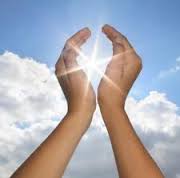
- Rainer Maria Rilke (adapted)
“Let me tell you why you are here. You’re here to be salt-seasoning that brings out the God-flavors of this earth. If you lose your saltiness, how will people taste godliness? You’ve lost your usefulness and will end up in the garbage. “Here’s another way to put it: You’re here to be light, bringing out the God-colors in the world. God is not a secret to be kept. We’re going public with this, as public as a city on a hill. If I make you light-bearers, you don’t think I’m going to hide you under a bucket, do you? I’m putting you on a light stand. Now that I’ve put you there on a hilltop, on a light stand—shine! Keep open house; be generous with your lives. By opening up to others, you’ll prompt people to open up with God, this generous Father in heaven. “Don’t suppose for a minute that I have come to demolish the Scriptures—either God’s Law or the Prophets. I’m not here to demolish but to complete. I am going to put it all together, pull it all together in a vast panorama. God’s Law is more real and lasting than the stars in the sky and the ground at your feet. Long after stars burn out and earth wears out, God’s Law will be alive and working. “Trivialize even the smallest item in God’s Law and you will only have trivialized yourself. But take it seriously, show the way for others, and you will find honor in the kingdom. Unless you do far better than the Pharisees in the matters of right living, you won’t know the first thing about entering the kingdom.
- Matthew 5.13-20 (The Message)
The passage cited above is perhaps better known (at least more broadly known) than any other from the Sermon on the Mount; at least the first part about light, that is. Most people know it, however, from the song it inspired. You know the one I mean, This Little Light of Mine. We’ve all sung it at one time or another: in children’s Sunday School, at summer camp, or in Vacation Bible School. It’s a harmless little ditty, lighthearted and casual; and it tends to bring back pleasant memories from our childhood that soothe and comfort us.
But, I must tell you; this perplexes me, because this simple, unpretentious song is inspired by one of the most challenging passages imaginable. Yet we seem to avoid its challenge by inserting our preferred interpretation of what it means to let your light shine. Whenever we sing it, we assume we know what light shine means. I remember, for example, growing up among fundamentalist-tending folk in the Deep South who interpreted the song for me as a child. “Be a good boy and do everything your momma asks you to do,” they said; and, “always, always avoid those Catholics,” whom they saw as the archenemy of all good Christians (read conservative, Protestant Christians).
As an older teen, I had advanced to a more sophisticated evangelical perspective; and the meaning of light shine was still assumed in a rather rigid sense that, surprisingly (or not) reflected the beliefs and biases of the group in which I found myself. To let your light shine meant to make sure you were different (read superior), from all those pagans who didn’t go to church. And it meant offering them the true beliefs that would transform them into faithful Christians. “Believe like we do,” they insisted, “And you will claim your ticket to heaven.”
As an adult - and a long-time student of faith, spirituality, and the Christian Biblical Tradition (among others) - I have found these interpretations lacking. They are good at spreading a rigid morality, and even a sense of superiority that any right-believing Christian can ostensibly claim. But they say little to nothing about living in community with God and other folk; nothing about walking a pilgrim pathway in the very real presence of God. So I decided to do something novel - and I invite you to do the same – I decided to turn directly to the Biblical Tradition and ask what Matthew’s Jesus has to say about light shine; and to seek other voices – like Isaiah 58.1-9a - that provide context and content as well.
Long story short (so as not to steal my own thunder from Sunday’s sermon), both Matthew and Isaiah sketch a faith that acts; a faith that humbly looks beyond religious orthodoxy and learning about God as the primary sense of what it means to be a Christian, and recommends actually doing something to address the needs of others. Rilke (in the worship heading above) expresses this sense well in noting that we only grasp God, we only illumine God’s meaning for life, with our doing… reaching out with compassionate hands and hearts to address human misery. So, perhaps we should change the expression let your light shine to let your life shine. What do you think?

 RSS Feed
RSS Feed



